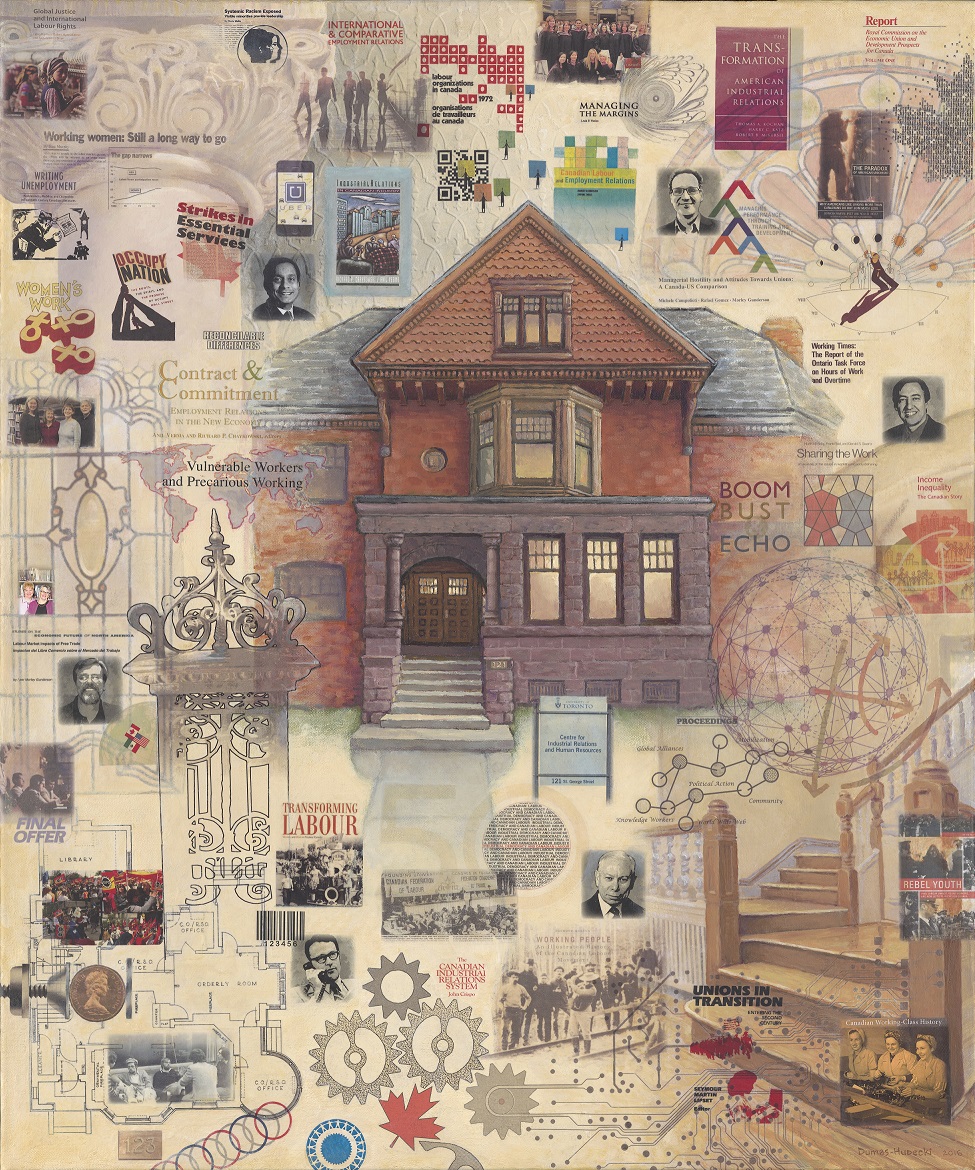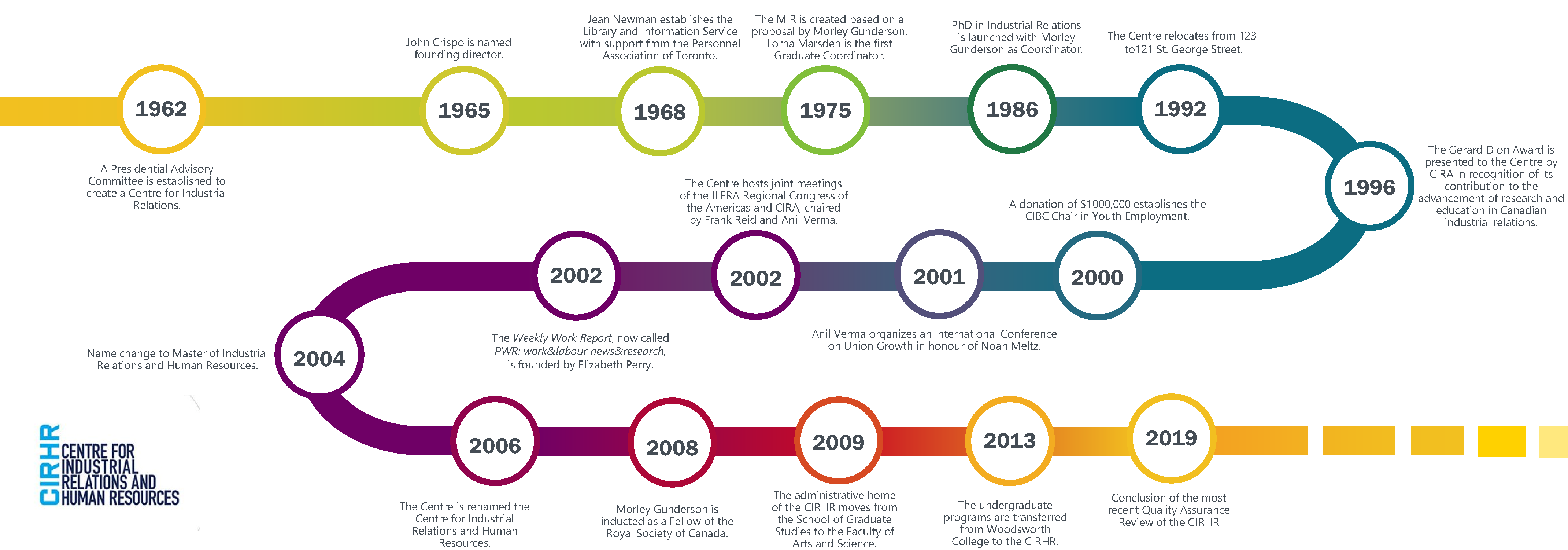
Since 1965, the Centre for Industrial Relations and Human Resources has brought together professors from many different disciplines and departments at the University of Toronto to teach and conduct research on all aspects of the workplace and employment relationships. The CIRHR faculty reflect the depth, breadth, and diversity of our university.
The CIRHR is located in a historic home with administrative and faculty offices, an on-site Library, student computer facilities, study space and a classroom. CIRHR Buildings Through the Ages tells the rich history of our buildings, past and present, including connections to notable Canadians like Group of Seven artist, Lawren Harris, and Ontario Premier, George Howard Ferguson. As part of the St. George (downtown) campus, the CIRHR is within a five-minute walk to the University of Toronto Robarts Library and Information Commons, the Rotman School of Management, the Faculty of Law, U of T’s Athletic Centre, and Graduate Student Residence, as well as the St. George Subway.
To celebrate our 50th anniversary, the Centre commissioned Pat Dumas-Hudecki — a creative art director and fine art painter with over twenty years of experience — to capture CIRHR’s history in one image, now publicly displayed at the Centre. Staff and faculty, past and present, along with imagery of relevance to the centre’s history, are all cleverly represented with mixed-media techniques.
| 1962 | Presidential Advisory Committee is established to create a Centre for Industrial Relations. |
|---|---|
| 1965 | John Crispo is named founding director. |
| 1968 | Library and Information Service is established by Jean Newman with support from the Personnel Association of Toronto. |
| 1975 | Master of Industrial Relations is created based on proposal by Morley Gunderson. Lorna Marsden is the first Graduate Coordinator. |
| 1986 | PhD in Industrial Relations is launched with Morley Gunderson as Coordinator. |
| 1992 | Centre relocates from 123 to 121 St. George Street. |
| 1996 | The Gerard Dion Award is presented to the Centre by the Canadian Industrial Relations Association in recognition of its contribution to the advancement of research and education in Canadian industrial relations. |
| 2000 | A donation of one million dollars by the Canadian Imperial Bank of Commerce establishes the CIBC Chair in Youth Employment. |
| 2001 | Anil Verma organizes an International Conference on Union Growth in honour of Noah Meltz. |
| 2002 | Centre hosts joint meetings of the International Industrial Relations Association Regional Congress of the Americas and the Canadian Industrial Relations Association chaired by Frank Reid and Anil Verma. |
| 2002 | Weekly Work Report, on online publication, is founded by Elizabeth Perry and renamed to the Perry Work Report when she retires in 2006. |
| 2004 | Degree name changes to Master of Industrial Relations and Human Resources. |
| 2006 | Centre becomes the Centre for Industrial Relations and Human Resources. |
| 2008 | Morley Gunderson is inducted as a Fellow of the Royal Society of Canada for his work as an internationally recognized scholar and pioneer in transforming the field of industrial relations in Canada. |
| 2009 | The administrative home of the CIRHR moves from the School of Graduate Studies to the Faculty of Arts and Science. |
| 2013 | The undergraduate programs are transferred from Woodsworth College to the CIRHR. |
| 2019 | Conclusion of the most recent UTQAP Quality Assurance Review. |
The Centre for Industrial Relations and Human Resources is a unique, supportive, and collegial community within Canada’s premier university, the University of Toronto.
Students study with professors from a variety of disciplines and with accomplished professionals from Toronto’s HR and IR communities. A world class library, a wide array of courses from which to choose, and the opportunity for a summer work placement prepare students for rewarding careers in labour relations, human resource management, and labour policy.
Outstanding Faculty
Internationally recognized, Centre faculty have edited or authored the leading textbooks in HRM, IR and research methods, as well as influential books in their areas of specialty. They are also outstanding instructors. Students rate overall effective teaching performance as excellent with instructors scoring an average of 6 on a 7 point scale.
IRHR Library
On-site, the IRHR Library is the foremost library in Canada in the field of HR and IR and a computer lab with wired and wireless connectivity.
Peer Recognition
In recognition of its contribution to the advancement of research and education in Canadian industrial relations the CIRHR received the Gerard Dion Award from the Canadian Industrial Relations Association.
Community
An informal and inclusive atmosphere, with small class sizes, an active student association, and plenty of opportunity for interaction among students, faculty, staff and alumni.
Interesting courses
Required courses are designed to provide theoretical frameworks and build HR and IR competencies, plus a full range of elective courses.
Networking
Toronto’s HR/IR community is at your doorstep with opportunities to participate in professional conferences and workshops. Networking events are scheduled throughout the year and an alumni mentorship program is available.
Work Experience and Employment Support
Full-time students in the MIRHR are provided job search support through a variety of career development programs including the Career Development Seminar, as well as one-on-one resume review and interview coaching.
Financial Support
A guaranteed funding package for PhD students and awards for MIRHR students that are based on academic merit as well as financial need are available.
Student Life
A vibrant student community supported by an extensive network of on-campus services that includes housing, accessibility resources for students with a disability, an International Student Centre, and the largest university Career Centre in Canada.
Reputation
Global Rankings consistently rate the U of T as the top Canadian university among the leading research institutions in the world. Become a student at Canada’s pre-eminent Graduate School.
CIRHR UTQAP Review 2019
The Centre for Industrial Relations and Human Resources competed the most recent review of the undergraduate and graduate programs in 2019 under the University of Toronto Quality Assurance Process (UTQAP). This page contains information about the review process and links to the CIRHR's self-study document and the Final Assessment Report & Implementation Plan.
The University’s full complement of undergraduate and graduate degree and diploma programs are reviewed on a planned cycle to ensure University of Toronto programs meet the highest standards of academic excellence. The Centre for Industrial Relations and Human Resources competed the most recent review of the undergraduate (Specialist and Major in IRHR, Certificate in Human Resource Management) and graduate (MIRHR and PhD) programs in 2019, completing a review process that began in the Fall of 2017. This built on a previous review completed in 2009; the next cyclical review of the CIRHR and its programs is scheduled for the 2024-2025 academic year.
The UTQAP for the conduct of Cyclical Program Reviews has five principal components:
- Self-study;
- External evaluation (peer review) with report and recommendations on program quality improvement
- University evaluation of the self-study and the external assessment report resulting in recommendations for program quality improvement;
- Preparation and adoption of plans to implement the recommendations and to monitor their implementation; and
- Follow-up reporting on the principal findings of the review and the implementation of the recommendations
Our Self-Study
The self-study is a broad-based, reflective, and forward-looking report that includes critical self-analysis. It is an assessment of the strengths and challenges facing the program(s) and/or unit, the range of its activities, and the nature of its future plans.
The CIRHR self-study was written by Director of the CIRHR (Prof. Rafael Gomez), Associate Directors Undergraduate and Graduate (Professors Lori Riznek and Frank Reid), and administrative staff at CIRHR. In compiling the Self-Study document, all stakeholders—faculty, staff, current MIRHR and PhD students, alumni and advisors were included. Emails were sent out calling for ideas, suggestions, and recommendations on the broad-based, reflective and critical analysis of program offerings, outcomes, resources and infrastructure, and meetings were conducted with current students and alumni.
The Table of Contents of the CIRHR self-study document are linked below; CIRHR students, staff or faculty wishing to have access to the full document can send a request to director.cirhr@utoronto.ca
The Reviewers Report
On Monday, June 4th and Tuesday, June 5th, Professors John Budd (University of Minnesota), Richard Chaykowski (Queen’s University) and Anthony Nyberg (University of South Carolina) visited the CIRHR as part of the University of Toronto’s Quality Assurance Program (UTQAP). Their report was prepared based on their meetings with CIRHR students, faculty, alumni, and staff, as well as the CIRHR Self-Study Document.
The reviewers’ report recognizes many of the things that we at the Centre are so proud of, noting that, “Overall, the Centre is one of the leading units in the field in Canada and internationally. The Centre is well-positioned to continue to advance both research and studies in the field of employment relations not only in Canada, but also internationally.”
The report also identifies challenges and potential strategies to help us grow and produce an even better set of academic programs.
The full reviewers’ report is not a public document and is not being circulated beyond the stakeholders involved in the review, but a summary of the review is included in the Final Assessment Report and Implementation Plan. CIRHR students, staff or faculty wishing to have access to the full document can send a request to director.cirhr@utoronto.ca
The Vice-Provost, Academic Programs has compiled a Final Assessment Report providing the institutional synthesis of the external evaluation and internal responses and assessments. This report identifies significant strengths of the programs and opportunities for program improvement and enhancement. It also sets out and prioritizes recommendations along with plans for implementation.
Some of the recommendations that are already being implemented to ensure the ongoing success of the CIRHR include:
- Planned undergraduate and MIRHR curriculum reviews
- Increasing the CIRHR PhD travel grant from $500 to $2,000 per student and creating more opportunities for PhDs to TA in the MIRHR program
- The recent hiring of new faculty, which significantly expands the capacity for CIRHR to put tenured and tenure-stream faculty in the classroom.
- The ongoing renovation of the CIRHR basement to create more functional and useful community space, as well as long-term reconfigurations of spaces in the CIRHR building and the new academic building in the Woodsworth precinct, which is currently in the design phase.



